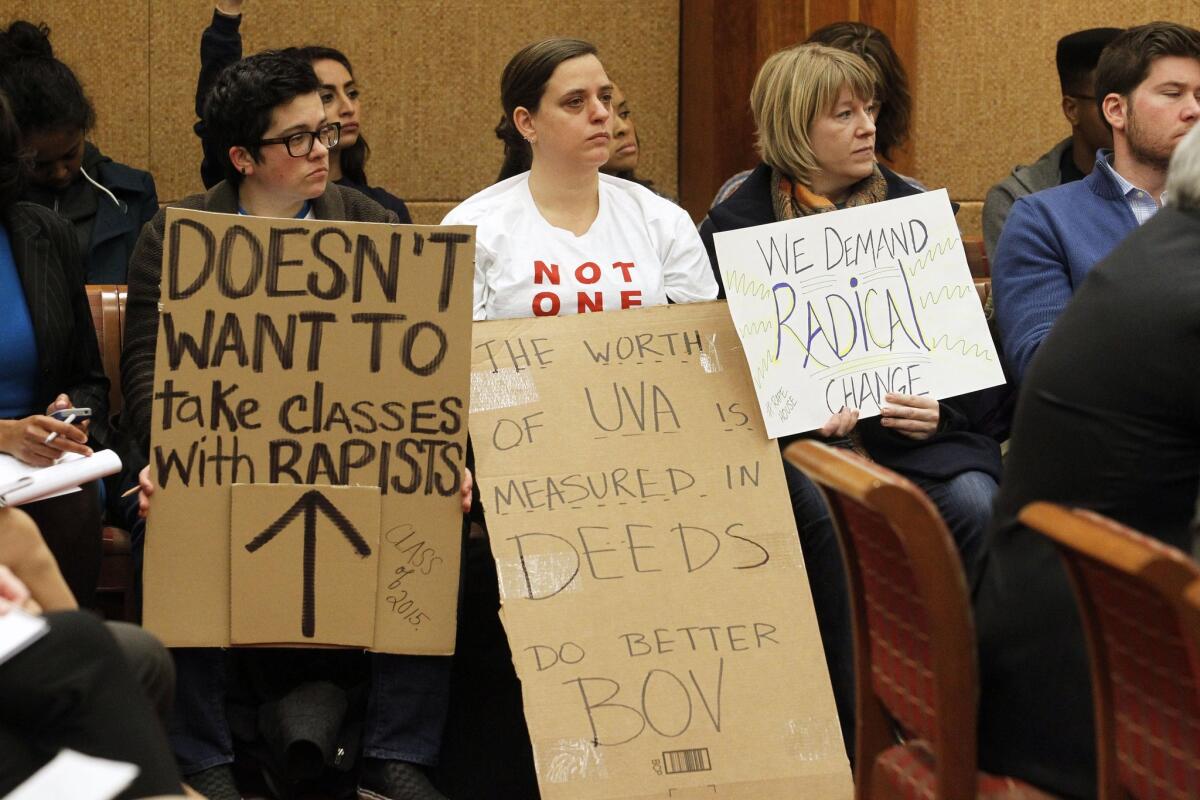Column: Rolling Stone rape story sends shock waves -- and stretches credulity

Rolling Stone has published an incredible story about a rape at the University of Virginia. The story has sent shock waves around the country.
But when I say the story is incredible, I mean that in the literal, largely abandoned sense of the word. It is not credible — I don’t believe it.
I am not saying terrible things don’t happen. I don’t think the author of the story, Sabrina Rubin Erdely, is deliberately fabricating facts, , nor do I believe that all of her reporting is wrong. There may in fact be an outrageously callous attitude toward sexual assaults at UVA. Rape, particularly date rape, may be a major problem there. I’ve talked to enough people with connections to the campus who think that part is credible enough.
But the central story isn’t about a spontaneous alcohol-fueled case of some cretin refusing to take no for an answer (an inexcusable offense in my opinion). It is an account of a sober, well-planned gang rape by seven fraternity pledges at the direction of two members. If true, lots of people need to go to jail for decades — if.
The basic story is this: Jackie was asked out on a date her freshman year by a junior named “Drew” (not his real name). After dinner, they went to a party at Phi Kappa Psi. Very quickly, Drew asks Jackie, “Want to go upstairs, where it’s quieter?”
Excited, Jackie is led to a “pitch black” bedroom. Almost instantly she is thrown on the floor. A heavy person jumps on top of her. A hand covers her mouth. Someone gets between her legs. Someone else kneels on her hair. And for the next three hours she’s brutally raped and beaten, with Drew and another upperclassman supposedly shouting out instructions to the pledges, referring to Jackie as “it.”
Much of what is alleged (though Erdely never uses the word “alleged”) isn’t suitable for a family paper. Some of the rest is unpersuasive. The pitch-black darkness doesn’t prevent Jackie from counting the pledges or from recognizing an attacker. The nicknames she hears — “Armpit” and “Blanket” — sound bizarre, even by fraternity standards.
At 3 a.m. Jackie leaves the still-raging party, “her face beaten, dress spattered with blood,” without anyone seeing her. Distraught, she calls three friends, Andy, Randall and Cindy (not their real names) for help. They arrive in “minutes.” One of the male friends says they have to take her to the hospital. Cindy replies, “Is that such a good idea?” adding, “Her reputation will be shot for the next four years.”
Erdely expounds: “Andy seconded the opinion, adding that since he and Randall both planned to rush fraternities, they ought to think this through. The three friends launched into a heated discussion about the social price of reporting Jackie’s rape.”
Really? If that’s true — and we don’t know that Erdely talked to anyone but Jackie about that conversation — these are among the worst friends imaginable. And what a convenient conversation for an expose of rape culture.
Similarly, when Jackie reports what happened to school authorities — again, this was supposedly a brutal, premeditated gang rape at a prominent fraternity — the dean is described as responding with all the emotion you’d expect if Jackie wanted to change majors.
Erdely admits she set out to find a sexual assault story at an elite school. She looked at lots of other colleges, but none “felt quite right,” in the words of a Washington Post media column on the piece. But UVA — which Erdely would go on to describe in the Rolling Stone article as a school without a thriving “radical feminist culture seeking to upend the patriarchy” — was just right.
Erdely wouldn’t tell the Washington Post if she made an effort to corroborate the story with Drew, let alone the pledges. Bizarrely, she won’t even say whether she knows the rapists’ real names. She seems more eager to talk about public policy than the facts she reported.
The same goes for much of the media, which have yet to independently corroborate the story, loading it instead with context about the “rape epidemic” and evidence supporting the questionable statistic that 1 in 5 college women are sexually assaulted. Then again, the media also uncritically reported Tawana Brawley’s stories and those of the accusers of the Duke lacrosse team — until the rest of the media started doing their jobs.
[email protected]Follow the Opinion section on Twitter @latimesopinion
More to Read
Sign up for Essential California
The most important California stories and recommendations in your inbox every morning.
You may occasionally receive promotional content from the Los Angeles Times.











